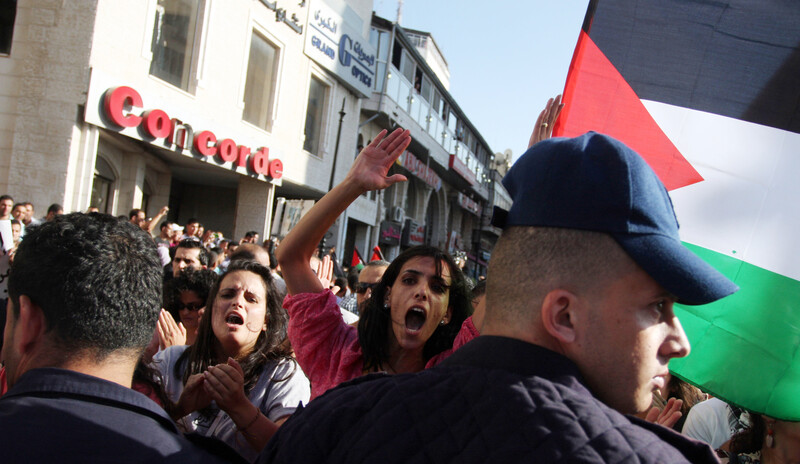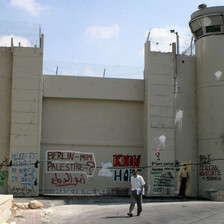The Electronic Intifada 3 July 2012

Palestinian Authority forces beat unarmed protesters and journalists in Ramallah.
APA imagesThe violent repression of demonstrations in Ramallah on Saturday, 30 June and Sunday, 1 July by Palestinian Authority police demonstrates the increasing unpopularity of the PA’s commitment to negotiations and normalization with the Israeli occupation.
After twenty years of failed negotiations, it is impossible to explain the rationale of talks while Israel accelerates the ethnic cleansing of Area C — 60 percent of the West Bank under total Israeli control — and settlement construction matched with the destruction of Palestinian homes and revocation of residency rights in Jerusalem.
Initially called by the civil society network Palestinians for Dignity, the 30 June demonstration was to protest the decision of Mahmoud Abbas, the PA president, to invite the ex-Israeli “defense” minister and chief of staff of the Israeli occupation forces, Shaul Mofaz, to Ramallah. Given Mofaz’s command of the Israeli occupation forces, and later the Israeli Ministry of “Defense” during the second intifada, he carries direct responsibility for numerous massacres and kidnappings, amongst the most notorious the use of bulldozers to destroy houses in the Jenin refugee camp in 2003, killing the residents inside.
War criminal welcomed by PA
The PA postponed the meeting in the last minute due to intense pressure from youth movements, political parties and from within the Fatah movement — and this undercut once again a much wider mass mobilization against the occupation. Yet the youth protests went ahead as scheduled.
The purpose was to underline the disgust that was felt in the Palestinian street about the initial invitation, particularly in light of the fact that war crimes arrest warrants have been issued against Mofaz in other countries, yet he is welcomed to Ramallah by the PA. The protests were to send a clear message to the PA that any attempt to reschedule the meeting, or a continuation with the redundant “negotiations,” would indeed be met with mass mobilization.
Saturday’s demonstration was still large by Ramallah standards, with approximately 1,000 participants. The steadfastness of the youth during the two days of protests, holding on to the simple demands of dignity and basic rights, has rightly earned them the full respect of our streets. They have become the conscience of our people.
The response to their actions by the PA echoed previous violent suppressions of protests in Ramallah during Operation Cast Lead in winter 2008-09, when PA police and mukhabarat (plain-clothed political police) used batons and (presumably Israeli- or US-made) tear gas to attack the crowd. The repression of solidarity with Gaza was so well-coordinated that the PA thoughtfully brought a unit of female police officers to beat the female protesters, not wanting to offend anyone’s sensibilities.
Outside support, training of the PA
The European Union and United States have been essential in the development of this PA “security” apparatus, with the United States, and specifically the CIA, taking responsibility for the training and organization of the various intelligence services (“CIA working with Palestinian security agents,” The Guardian, 17 December 2009).
The European Union Police Mission in the Palestinian Territories (EUPOL COPPS) takes responsibility for training the police. Instances of torture in PA prisons is well documented, abuses which EUPOL COPPS has directly contributed to through the training of prison officers in “riot control” techniques (see the mission’s press release, “20 Palestinian prison officers conclude 3 training courses in quelling prison disorder,” 28 March 2012).
EUPOL COPPS, as stated on its website, is committed to “strengthening law and order.” Given that Palestine is occupied by Israel, and that Palestinians are subject to Israeli military law, the application of logic would lead to a conclusion that EUPOL COPPS, and thus the PA “security” forces, may as well end up “strengthening [Israeli military] law and [the unjust] order” of the occupation.
A note of historical interest is that the former head of the EUPOL COPPS mission to the PA, between January 2009 and January 2010, was Paul Robert Kernaghan, a former Chief Inspector with the Royal Ulster Constabulary, the notorious paramilitary, Protestant- dominated police force enforcing British colonial rule in the North of Ireland.
Kernaghan achieved a relatively high-rank in the constabulary between 1978 until 1991. The force regularly colluded with loyalist death squads in the sectarian murder of Catholic civilians, and violently suppressed demonstrations with live and rubber-coated steel ammunition (see “NI police colluded with killers,” BBC News, 22 January 2007). The rubber-coated “baton rounds” alone were responsible for the deaths of seventeen civilians, eight of them children (see the University of Ulster’s Conflict Archive on the Internet). That such a man should be appointed to lead the EU mission speaks volumes about the priorities of the development of the PA “security” apparatus, with the emphasis clearly on suppression of dissent.
Such suppression of dissent was seen on Saturday and Sunday. The use of tactics similar to those experienced by the Arab Spring — undercover mukhabarat using metal chains and batons to beat unarmed protesters, attacks on journalists, beatings of women and young people, kidnapping protesters from the street and beating them in regime police stations — is a sign that any veneer of respectability and legitimacy that the PA has so worked hard to attain, is wearing thin.
Cracked skulls blow to PA image
The PA batons on Saturday and Sunday not only cracked the skulls and bones of Palestinians, but, most significantly, served another blow to the image of the PA security forces and its commanders.
The police force is a central element of the PA structures, with some 30 percent of the overall budget going to the security forces and, for comparison, only 0.1 percent to the agricultural sector. Thus, no surprise that the chant of the people on Sunday as they were beaten, as if to drown out the screaming, was “Down with the military regime!”
The echoes of the now world famous chant of the Arab Spring — “the people demand the downfall of the regime” — are clear. The violence of the PA police has laid bare the inherently oppressive nature of a police and intelligence regime that seeks to control the political path of a people living under brutal occupation. It needs no reminding that the violence and corruption of the police has been the spark, and the added fuel, for the revolutions of the Arab world, with armed defenders of the status quo becoming symbols of the great injustices of society.
Of course the usually poor, often young police officers on the street are not the architects of this injustice, nor do they necessarily benefit from it. However, they are the ones who violently beat and torture unarmed Palestinian civilians. They are the ones who implement the policies that violate our freedom of protest, assembly and expression in a climate in which the decisions made in the PA corridors of power are increasingly removed from the needs and demands of the people.
The invitation of Mofaz was a provocation to every Palestinian but unfortunately signals a much bigger problem that the Palestinian people must urgently address. The reaction of our youth, their steadfastness and determination, gives us hope that a new generation is ready to take a leading part in the difficult and delicate task of envisioning and working towards a new political horizon.
Jamal Juma’ is the coordinator of the Grassroots Palestinian Anti-Apartheid Wall Campaign based in the West Bank.






Comments
translation of the article in arabic
Permalink wassim replied on
well done article.. should be translated to Arabic if its still not yet, and if its translated please add the link
brutal oppression of dissent
Permalink Sandra Twang replied on
"Of course the usually poor, often young police officers on the street are not the architects of this injustice, nor do they necessarily benefit from it. However, they are the ones who violently beat and torture unarmed Palestinian civilians. They are the ones who implement the policies that violate our freedom of protest, assembly and expression in a climate in which the decisions made in the PA corridors of power are increasingly removed from the needs and demands of the people."
All free people, and we are free in our hearts and minds although our physical realities are burdened, need to recognize that asking an oppressor to provide our rights , to safe guard our dignity and freedom is a sad waste of time. If these powers that seem so prevalent in all societies and countries are allowed to continue with their brutal agenda, and continue to be allowed to put the mechinisms of oppression in place... I believe that there will come a time very soon , when the most heartfelt resistance will no longer be able to effect any change. I personally no longer feel as if I am of a national character, I feel that excuses for "confused" human beings who do not understand that they are part of the oppressors machinations is an insane excuse. If the police in Ramallah , are that confused as to human dignity , and human rights, which I do not accept that excuse, then that confusion should not carry any compassion or concern for those who resist oppression.
My heartfelt thanks to those who stood against this blatant disrespect for the Palestinian people. As always you continue to set the highest example.
arabic translation
Permalink SAM replied on
yes i agree these articles should be translated to arabic for an arabic audience to read.
electronic intifada needs to have an arabic section, get a translator to translate the blogs and articles in order to reach the people... as an independent source
an article like this one is more useful to the palestinian arabic speaking audience
Ramallah protests
Permalink tasleem replied on
For years we in the anti-Zionist movement in South Africa have recognised that the PA does not truly represent the will of the Palestinians. We continue to be active and pray for Justice to be established in the land.